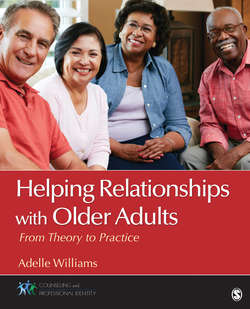Читать книгу Helping Relationships With Older Adults - Adelle M. Williams - Страница 58
На сайте Литреса книга снята с продажи.
Reconfiguring Work and Retirement
ОглавлениеMany workers of all ages desire to be their own boss and chart their own path. According to research by the Ewing Marion Kauffman Foundation (2011), older baby boomers (aged 55–64) are driving a new entrepreneurship boom. The average age of the founders of high-tech companies is nearly 40, and there are twice as many founders over the age of 50 as there are under the age of 25 (Ewing Marion Kauffman Foundation, 2011). The Great Recession of 2008 brought about the highest unemployment levels since the Great Depression. Many of these older boomers are becoming part of the “second chance revolution” (Rogoff & Carroll, 2009).
Baby boomers are overturning long-standing assumptions about working until age 65, calling for dramatic changes in current employment practices, and proving that retirement and working are not mutually exclusive. The crux of their vision is born out of today’s realities including the prolonged recovery from the Great Recession and retirement savings’ shortfalls as well as the extraordinary gifts of increased longevity, active living, healthy aging, and opportunities to stay engaged and involved (Collinson, 2014).
Sixty-five percent of baby boomer workers plan to work past age 65 or do not plan to retire. More than half (52%) plan to continue working after they retire. Given the current level of inadequate savings, it is not surprising that 62% of the baby boomer workers who plan to work in retirement and/or past age 65 indicate that their main reason is income or health benefits. One-third (34%) plan to continue working for enjoyment, including 18% who want to stay involved and 16% who enjoy what they do (Collinson, 2014).
For most baby boomer workers, retirement is no longer a point in time in which one immediately stops working. Sixty-eight percent of baby boomer workers envision a phased transition into retirement during which they will either continue working, reducing hours with more leisure time to enjoy life, or work in a different capacity that is less demanding and/or brings greater personal satisfaction. Only 21% expect to immediately stop working when they retire and 12% are “not sure” (Collinson, 2014). Boomers will likely remain taxpayers and part of the active economy for longer than most economists assume. If this occurs, millions of boomers will be income-producing assets, not liabilities, on society’s balance sheet well into their 70s and beyond (Goldsmith, 2008).
Moreover, the boomers cannot always be replaced even if they do wish to retire. The United States faces a looming and potentially crippling shortage of skilled workers that affects its vital infrastructure—schools, the health care system, government at all levels, and even manufacturing. Forecasts suggest a costly shortage of skilled workers in the future with the retirement of the baby boomers. Knowledge-based enterprises will have a particularly difficult time replacing their older workers (Goldsmith, 2008). Retirement consultant and author Dave Bernard (2013) wrote, “age 54 is just another year in an ongoing career and retirement has no set time frame” (p. 1). This can give pause to those who have thought of aging and retirement in a traditional sense. With this delayed retirement can come challenges for baby boomers.
